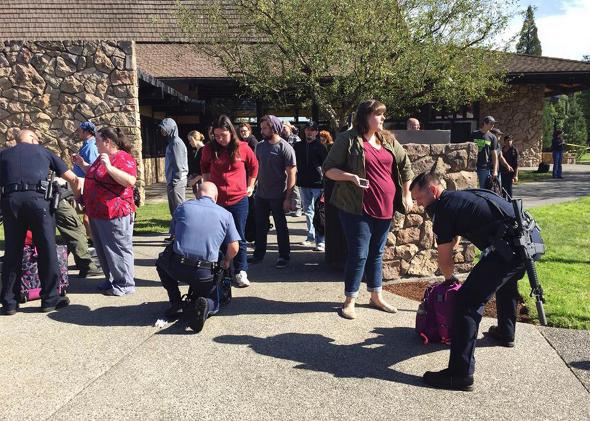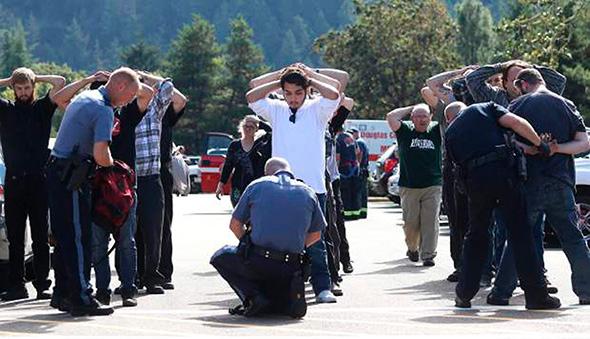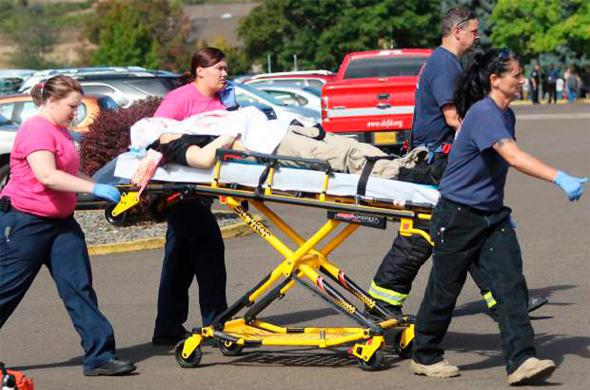By now, we all know that there’s been another school shooting, this time at Umpqua Community College in southern Oregon. But for what seemed like a very long time this afternoon, that was all we knew. Further details were hard to come by, which posed a challenge to the many journalists who were tasked with reporting on what had—and hadn’t—happened. If you, like me, were toggling between the three main cable news networks this afternoon as they struggled to report the story in a virtual information void, you saw three different and distinct journalistic strategies at work: circumspection, observation, and pontification. Here’s what I glimpsed, and here’s where I saw it.
2:40 p.m. ET
Shepard Smith anchors Fox News’ coverage of the story this afternoon, and he and Fox correspondent Trace Gallagher are doing their best to refrain from spreading rumors and falsehoods in the absence of any verified information. “We have confirmed the shooter is no longer an active threat. We don’t know if he’s the only shooter,” says Gallagher, who proceeds to note that, in the absence of reliable casualty data from the police, it would be irresponsible to speculate on the number of victims. This is good work from Fox here.
At this point Fox evidently knows very little. The network has no cameras on the scene and no access to other stations’ live feeds, so it’s forced to go low-tech. A breaking-news article from a newspaper called The Union is called up on a big screen, and Smith is literally reading the article out loud, following along with his finger as the camera zooms in on the text. Once this grows tiresome, Smith walks to the other side of the studio, where a map of the Umpqua Community College campus has been magnified to fill an entire wall. “So the best info that we have at this moment, just about an hour after the first reports came in, is that it started here at Snyder Hall and move on to the Science building,” says Smith as he points at the map, which looks like it was hastily downloaded from the UCC website. “This is about the extent of the information we have at this point.” He lingers on Snyder Hall, as if grabbing for something solid to anchor himself in a torrent. Soon, there’s some new information: “Our information specialist says that [the Umpqua Community College] website is down at the moment.”
2:50 p.m.
Over to CNN, where anchor Brooke Baldwin has much more to work with than Fox did; her producers are doing good, quick work finding guests to call and offer some information on the shooting and the region. When I tune in, a guest is giving Baldwin some demographic information on the UCC student body: more than half of the student population is female; the average student age is 38. (“Huh,” remarks Baldwin.) “That’s what we’re learning so far: That it’s not your traditional institution, it caters to people who are a little bit older, the majority of them part time,” reports CNN, and this, too, is good work; if you can’t say anything meaningful about the incident itself, you might as well offer some context on the setting in which it occurred.
Soon, CNN brings in a guest who does have some information about the incident itself: Ray Shoufler, a local fire marshal, who is phoning from the grounds of Umpqua Community College. “Law enforcement was on scene and had the shooter…neutralized,” he reports. “I don’t have a tally on the total number.”
“Describe what we cannot see,” Baldwin says, the tone of her voice indicating she knows this is a tough ask. “How many ambulances? How many first responders? Did this happen inside or outside?”
“It happened inside a classroom,” says Shoufler, who proceeds to offer a few more factoids before briefly going silent. “Ray, are you OK?” asks Baldwin. She seems to think he’s overcome with grief, which seems a bit presumptuous.
“Yes,” Shoufler says, and he doesn’t sound like he’s choking back any tears. “I’m just getting multiple people, and…there’s a lot going on.”
3 p.m.
I tune to MSNBC, which has wasted no time trying to situate the shooting in a broader political context. While I understand, and to an extent agree with, this big-picture impulse, the network’s rush to speculate on what the Umpqua shootings mean, at a stage in the story when we’re not even sure what happened yet, feels clumsy and mildly inappropriate. Brian Williams is in the anchor chair, and he’s speaking with former ATF hostage negotiator Jim Cavanaugh, who says that mass shootings are “a crisis in every county and city in America. It’s been in your state, it’s comin’ back, it might be a movie theater or campus. It’s not gonna go away; we’ve gotta address it at each and every step along the line.”
Like Fox and CNN, MSNBC is reporting in an information vacuum at this point; unlike the other two networks, MSNBC and Williams are spending a lot of time talking about what we will probably learn in the coming hours and days. It’s an irritating choice. “We’re going to learn days from now, hours from now, about someone who did some elaborate planning for this moment,” Williams says. “We’ve had another mass casualty event on another campus.”
Soon, Williams goes to MSNBC host Thomas Roberts, who proceeds to read some tweets presumably issued by people who were on campus when the shooting occurred. “Holy God, this is the scariest thing I’ve ever seen,” one tweet reads. More social-media recitations follow. “Let me scroll down,” Roberts says.
Around 3:10 p.m.
Over on Fox News, Shepard Smith’s producers have finally come back from lunch, and they’ve put him in touch with a local woman named Marilyn Kittelman, whose son, an Umpqua Community College student, is currently awaiting evacuation. “Ms. Kittelman, have you been given information?” Smith asks. “The best information I have is that this gunman, whoever he is, went to Snyder Hall and opened fire.”
“What I heard is that it happened in the science building,” Kittelman says.
“Next to Snyder Hall,” Smith interjects. Kittelman notes that her son, who was in neither the science building nor Snyder Hall, said that he heard no gunshots, and says she’s heard rumors that there might be more than one shooter. Smith quickly and politely notes that the authorities have given him no reason to think that’s true, and again I’m impressed by Smith’s reportorial caution in this dangerous journalistic terrain. He asks Kittelman if she’s heard anything from any of the students who were in the room where the shooter first opened fire, and she says that she hasn’t. “Oh, hold on, I have an update!” Kittelman exclaims. “They said that there’s a rumor that a rioter is hiding in a car.”
“I don’t know what a ‘rioter’ is,” says Smith.
“I don’t either.”

Police officers inspect bags as students and staff are evacuated from campus following a shooting incident at Umpqua Community College in Roseburg, Oregon October 1, 2015.
Photo by Michael Sullivan/The News-Review via Reuters
Roughly 3:15 p.m.
Back to CNN, where national correspondent Deborah Feyerick and Brooke Baldwin are fruitlessly dissecting Ray Shoufler’s decision to say that the shooter had been neutralized, as opposed to killed or captured or something more precise. “The use of the word neutralized is so odd. Not the sort of word you use,” says Feyerick.
“What does that tell you?”
“It makes me wonder how they’re using the word neutralized. We don’t know if he’s alive or dead.”
This line of inquiry is neither fruitful nor interesting, and it is mercifully abandoned as Baldwin brings in CNN military analyst Rick Francona, who offers some interesting context on Oregon state gun laws. The Umpqua Community College campus was reportedy a gun-free zone, a designation that “tells licensed gun owners that you are not allowed to carry your weapon in this facility,” Francona says. “Conversely… if you’re going to perpetrate some act, you know that most people are not going to be armed.” This is the sort of bigger-picture analysis that’s actually helpful, insofar as it directly relates to and helps clarify aspects of the situation on the ground in Oregon.
Unfortunately, Baldwin soon drops this line of conversation and returns to her earlier semantic discussion: “The shooter has been neutralized. Does this mean that the shooter is alive or dead? We don’t know that yet.” CNN reports that they are hearing that the attack began in the school’s science building, and soon spread to various classrooms. Baldwin’s producers have found her another guest. “I’m being told here in my ear, we’re just going with this: Marilyn Kittelman is on the line here,” she says.
Nearing 3:30 p.m.
That’s my cue to switch over to MSNBC, where in the absence of any good information about what has happened, Brian Williams and his guests continue to speculate on what we will probably learn about this incident in the near future. “I’m afraid you’re correct that this’ll kick off a whole new wave of coverage about gun laws, about gun laws and mental health in this country,” Williams tells a guest, “and that in the coming days we’ll hear a whole lot more about this troubled person.” Just minutes earlier, CNN was also talking about gun laws. But CNN was doing so in a reportorial context. Williams seems to be talking about them just to hear himself talk.
Another guest, former FBI profiler Clint Van Zandt, elaborates on this same theme. “We will see parents anguished, standing up, saying ‘Why can’t we do something about guns, about mental health? Why did [my child] have to die in something like this? And, Brian, we don’t have the answers.”

Photo by Michael Sullivan/The News-Review via Reuters
Van Zandt notes—and this is actually very helpful—that the UCC shooting is the 45th campus shooting logged in the United States so far this year. “This will dominate life in the foreseeable future for this part of southern Oregon,” Brian Williams predicts, and then he predicts some more stuff: “We will hear a lot about someone who perhaps had a troubled background, perhaps took it out on others.”
We probably will hear all of those things, and more, in the coming days. But in the early stages of a breaking-news incident like a school shooting, it’s critical for networks to emphasize the things they don’t know rather than feign a certitude that doesn’t exist. At half past three, I tuned back to Fox and Shepard Smith, who, out of all of the anchors on the air this afternoon, seemed to understand this the best. “It’s 3:30 on the East Coast, half past noon on the West Coast,” Smith intones. “And in the town of Roseburg … ”
